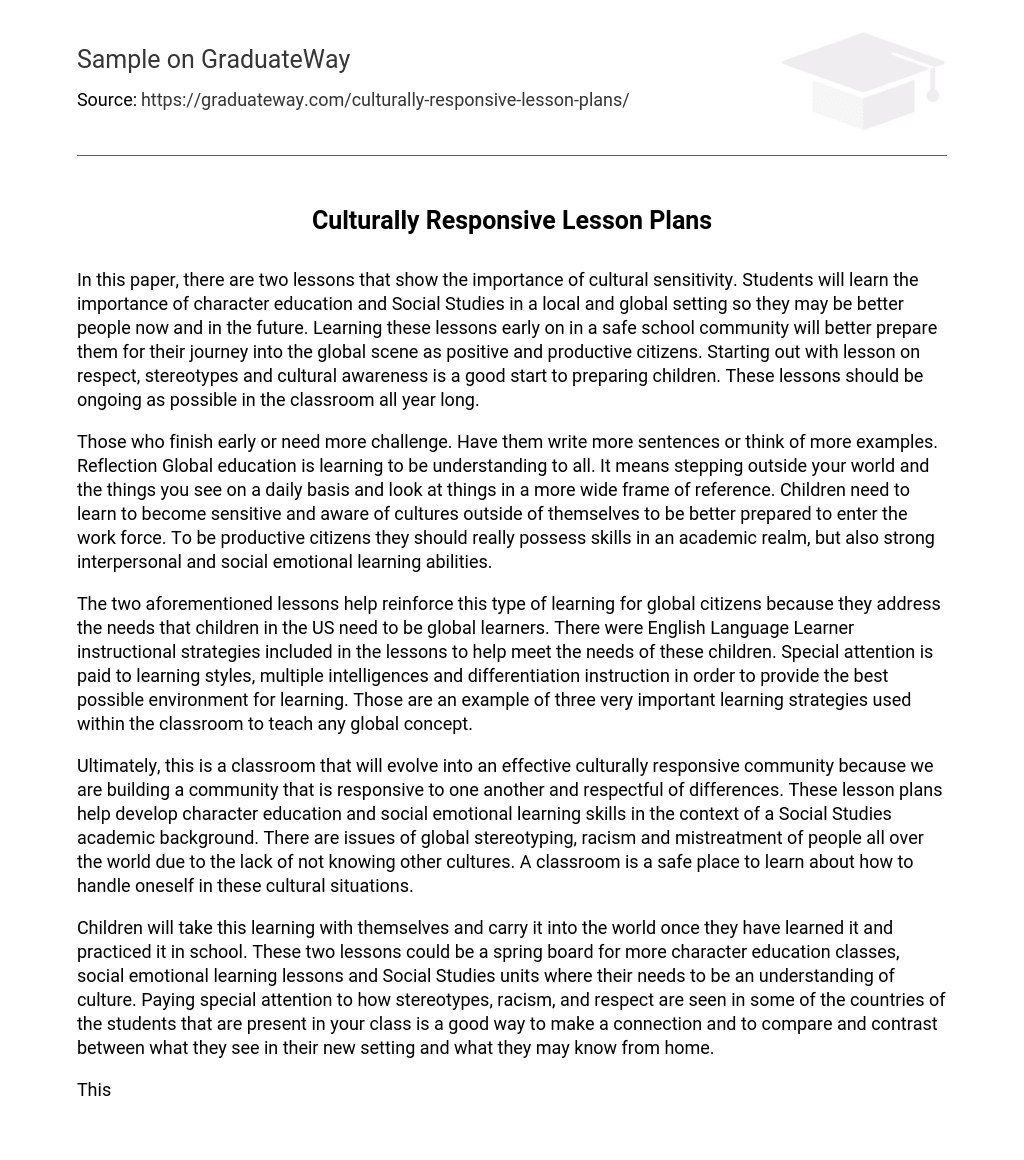This paper highlights the significance of cultural sensitivity through two lessons. It emphasizes the value of character education and Social Studies in both local and global contexts, aiming to develop students into better individuals presently and in the future. By learning these lessons within a secure school community, students will be better equipped to contribute positively to the global stage as productive citizens. Commencing with teachings on respect, stereotypes, and cultural awareness, it is crucial to continuously incorporate these lessons throughout the academic year.
For those who complete tasks ahead of time or need more stimulation, motivate them to generate extra sentences or brainstorm additional examples. Reflection: Global education consists of cultivating comprehension and compassion for all individuals. It involves surpassing one’s personal experiences and viewpoints to investigate a broader array of ideas. It is essential for children to acquire knowledge about and value diverse cultures in order to be adequately prepared for future job prospects. Alongside academic aptitude, they should also foster robust interpersonal and social-emotional learning capabilities in order to become valuable contributors to society.
The two mentioned lessons enhance this type of education for global citizens by addressing the needs of children in the US who must become global learners. The lessons integrate instructional strategies for English Language Learners to assist these children. The emphasis is on learning styles, multiple intelligences, and differentiated instruction to establish an ideal learning setting. These are three crucial educational approaches employed in the classroom to teach any global concept.
In the end, this classroom is a community that will adapt and become a culturally responsive community by fostering responsiveness and respect for one another’s differences. These lesson plans aim to develop character education and social emotional learning skills within the realm of Social Studies. The lack of knowledge about other cultures has resulted in global stereotyping, racism, and mistreatment of individuals worldwide. Therefore, the classroom provides a safe environment to learn how to navigate these cultural situations.
Children will carry the knowledge and practice gained in school into their lives. These lessons can be a starting point for further character education, social emotional learning, and Social Studies units focused on understanding different cultures. A good strategy is to explore how stereotypes, racism, and respect manifest in the countries represented by the students in your class. This allows for connections to be made and a comparison made between their new environment and their home.
This is an effective method for fostering tolerance and expanding children’s knowledge. Exploring online stories, newspapers, and other media sources can help children learn about unfamiliar places and cultures, thus integrating geography, sociology, and anthropology into their studies. It is a means of teaching global issues in schools. However, encountering a resistant or disinterested student may present a challenge for teachers. In such cases, teachers need to exhibit patience and devise alternative approaches to engage the student. They must persist in finding ways to connect with the student without giving up.
These lessons have numerous benefits as they allow children to learn important life lessons through hands-on activities that are appropriate for their level of learning. The inclusion of food, such as bread, and the exploration of other countries are aspects that appeal to all children, especially primary students. By utilizing literature and activities that are tailored to their level, children feel more comfortable and are more likely to engage and learn. * Conclusion * Ultimately, it has been incredibly empowering to learn about global issues and incorporate culturally responsive teaching into our lessons. Teachers must be responsive and connect classroom learning to topics that are meaningful both locally and on a global scale.
These are important pieces that make up powerful instruction. I have learned a lot from this course and it is reflected in my lesson plans. As I complete this course, I realize the importance of meeting the needs of all my English language learners and ensuring their proper preparation. I must continuously seek out materials, resources, and assistance to stay updated on the latest theories and developments in my field. Failing to do so would adversely affect my teaching and be a disservice to my students. I am excited for many more years of dedicated teaching.





